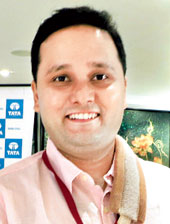 |
Exchange effort
All Amish wanted to do was to go to Israel to participate in “Celebrating India in Israel”, a festival of visual and performing arts. What the bestselling author of Shiva Trilogy didn’t contend with was that some people would find that offensive. The Indian Campaign for the Academic and Cultural Boycott of Israel, which has members like Githa Hariharan, Arundhati Roy and M.K. Raina, has urged the author not to attend the festival. But Amish insists that he would be going as a spiritual tourist. “This is a programme organised by the Indian government for cultural and spiritual exchange with Egypt and Israel. Egypt is the cultural heartland of the Arab-Islamic world and Israel is the fount of all Abrahamic religions (Judaism, Christianity and Islam),” he says. “I am going as someone who is seeking to learn more about religions other than my own. Also, I am going to share my understanding of my own religion, Hinduism. Only when we understand other religions as deeply as we understand our own, can we find ways to co-exist.” Well said.
Poll call
Who says you can have loyalty to just one political party? Ask Kannada actor Darshan, who campaigned for as many as four candidates in the Assembly polls in Karnataka. And while at it, he showed amazing catholicity of taste — he lent his star power to candidates who belong to three different, and rival, political parties — the Congress, the BJP and the JD(S). “I’m campaigning for the candidate, not the party,” says an unfazed Darshan. Quite so. Or, as any Indian would tell you, aren’t all political parties the same?
Fitting tribute
Kamal Swaroop, director of Om-Dar-Ba-Dar, which won a critics’ award for best film in 1989, is on a different track now. He has come out with a book called Tracing Phalke, which was launched on May 2. Happily, the date co-incided with the day Dadasaheb Phalke’s 50-minute silent feature film Raja Harishchandra was released in 1913 at the Coronation Cinema Hall in Bombay. Swaroop’s book traces the life of Dhundiraj Govind Phalke (Dadasaheb Phalke) through illustrations, photographs and information right up to the time he made his pioneering film. A fitting commemoration of 100 years of Indian cinema, no doubt.
 |
Tea and sympathy
Anurag Basu has put his heart and soul in this Ummeed ka Pyaala (Cup of Hope). The director of films such as Barfi! and Life in a… Metro is supporting an initiative by a leading tea brand to help children with disabilities. As part of the campaign, a van will criss-cross India, selling a cup of tea at Re 1. Funds raised from this will be donated to various institutes helping children with disabilities. “Persons with disabilities are no different from others. They too wish to grow up with dignity and acceptance. All they need is a little help to achieve their dreams.” Clearly, Basu is a man on a noble mission.
 |
Love guru
He made his debut with I Am Kalam, a film that won many national and international awards, and followed it up with Jalpari, another children’s film. But this time director Nila Madhab Panda has a completely different target audience. “I see so many youngsters falling in love and falling out of it in no time. Relationships fail for the flimsiest of reasons. I thought I should make a film on this,” says Panda. The film, titled Love is not Mathematics, has been shot in Delhi and some other parts of the country. But what’s with the strange name? “This movie will show how you can fall in love with the same person every day of your life. Love is simple,” replies Panda. Really? That would be news to a lot of people.











